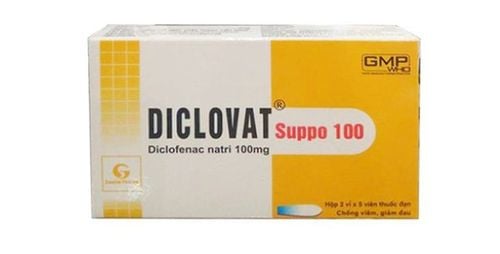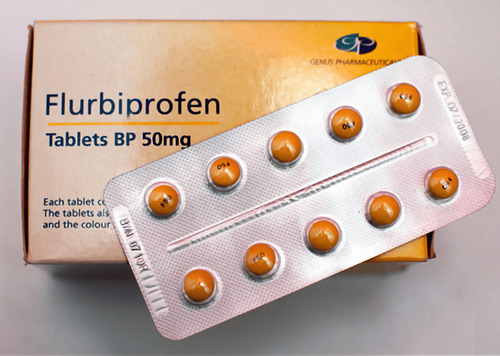This is an automatically translated article.
Diclothepharm is a drug belonging to the group of non-steroidal anti-inflammatory drugs when used requiring a prescription, with the main active ingredient being diclofenac sodium 50mg.. Diclothepharm is used to treat arthritis, relieve pain after injury, . ...Diclothepharm is made in the form of enteric-coated film-coated tablets, produced by Thanh Hoa Pharmaceutical and Medical Supplies Joint Stock Company.
1. What is Diclothepharm?
What is Diclothepharm? Diclothepharm is a drug belonging to the group of non-steroidal anti-inflammatory drugs when used without a prescription, with the main active ingredient being diclofenac sodium 50mg.. Diclothepharm is used to treat arthritis, relieve pain after injury, .. ..
Diclothepharm is prepared in the form of enteric-coated film-coated tablets, packing specification box of 10 blisters x 10 enteric film-coated tablets, box of 50 blisters x 10 enteric-coated film-coated tablets, box of 100 blister x 10 enteric-coated film-coated tablets. In each Diclothepharm tablet, in addition to the main ingredient, diclofenac sodium, it also contains excipients just enough to help ensure the volume, solubility, and stability of a pill. Diclothepharm is produced by Thanh Hoa Pharmaceutical - Medical Supplies Joint Stock Company.
2. Indications of the drug Diclothepharm
Diclothepharm is specifically indicated in the following cases:
Used to treat chronic arthritis, degenerative joint disease. Treatment of primary dysmenorrhea (also called dysmenorrhea). Treatment of acute pain caused by post-traumatic inflammation, swelling and chronic pain. Treatment of juvenile rheumatoid arthritis. In addition, Diclothepharm is also indicated in some other cases when prescribed by a doctor.
3. Contraindications of Diclothepharm
Diclothepharm should not be used in the following patients:
Patients with a history of allergy or hypersensitivity to any component of the drug Diclothepharm Patients with a history of allergy to other non-steroidal anti-inflammatory drugs . Patients with liver failure, severe renal failure, patients with coagulopathy, patients with cardiovascular diseases, people with asthma or bronchospasm. Patients with ongoing gastric or intestinal perforation, peptic ulcer or active peptic ulcer, are at risk of gastrointestinal bleeding. The patient has a collagen disease (also called an autoimmune disease).
4. Dosage and how to use Diclothepharm
Diclothepharm is used as prescribed by the doctor. You can refer to the dosage of Diclothepharm as follows:
Used to treat rheumatism: Use an attack dose of Diclothepharm: 1 tablet/time x 3 times/day. Then use maintenance dose: 1 tablet / time x 2 times / day. Used to treat acute pain or primary dysmenorrhea: 1 tablet/time x 2-3 times/day. Note: Using Diclothepharm at the lowest effective dose for the shortest time can prevent cardiovascular complications.
5. Diclothepharm side effects
Diclothepharm can cause unwanted effects. Common side effects of Diclothepharm include:
Headache, dizziness, dizziness, drowsiness, tinnitus, visual disturbances. Abdominal pain, flatulence, indigestion, loss of appetite, nausea, vomiting. Urticaria Anaphylaxis Jaundice, increased transaminases, increased hepatotoxicity Chest pain, heart failure, palpitations, palpitations, myocardial infarction, risk of cardiovascular thrombosis. Risk of stomach ulcers Gastrointestinal bleeding
6. Be careful when using Diclothepharm
Use Diclothepharm at the lowest daily dose to be effective in the shortest possible time to minimize the risk of unwanted side effects of the drug Use caution when using Diclothepharm in patients with asthma , seasonal allergic rhinitis, COPD, hypertension, diabetes, patients with renal failure, liver failure, systemic lupus erythematosus, heart disease with systemic fluid retention. The patient has an active infection, a history of peptic ulcer disease, a history of coagulopathy, bleeding. Monitor and evaluate liver function in patients using Diclothepharm for long-term treatment. Patients with cardiovascular disease or risk factors for cardiovascular disease. Use caution when using Diclothepharm in pregnant women, only use the drug when absolutely necessary, weigh the benefits outweigh the risks, only use Diclothepharm when approved by the doctor. Women who are trying to become pregnant should not take Diclothepharm, because it inhibits embryo implantation. In patients with visual disturbances when taking Diclothepharm, it is necessary to have adequate monitoring and ophthalmological examination.
7. Drug interactions
Diclothepharm may interact with the following drugs:
When using Diclothepharm with Digoxin at the same time, the active ingredient diclofenac may increase the concentration of digoxin in the blood. Increased risk of bleeding when Diclothepharm is co-administered with anticoagulants and antiplatelet agents. When using Diclothepharm in combination with antibiotics of the quinolone group, it may increase the side effects on the central nervous system of the quinolone antibiotics, leading to convulsions. When using Diclothepharm in combination with aspirin or glucocorticoids: Reduces diclofenac plasma concentrations and increases the risk of gastrointestinal ulcers. When Diclothepharm is used together with SSRIs (serotonin reuptake inhibitors): increased risk of gastrointestinal bleeding. When using Diclothepharm together with diflunisal: increases the concentration of diclofenac in the blood plasma. When using Diclothepharm in combination with Lithium: may increase the serum lithium concentration to toxic levels, it is necessary to adjust the dose of lithium during and after treatment with Diclothepharm. When using Diclothepharm in combination with methotrexate: increased toxicity of methotrexate. When using Diclothepharm in combination with ticlopidine: increased risk of bleeding. Antihypertensive drugs such as beta-blockers, angiotensin-converting enzyme inhibitors; diuretic; diabetes medications. When using Diclothepharm in combination with cyclosporin: increases the risk of cyclosporin poisoning. Therefore, it is necessary to regularly monitor renal function in patients. When using the drug Diclothepharm in combination with tacrolimus increases the risk of nephrotoxicity. When using Diclothepharm in combination with phenytoin: increased plasma concentrations of phenytoin. When using Diclothepharm in combination with colestipol and cholestyramine: hindering or reducing the absorption of Diclothepharm. Therefore, Diclothepharm should be taken at least 1 hour before or 4-6 hours after taking colestipol, cholestyramine. When using Diclothepharm in combination with strong inhibitors of CYP2C9: may increase the concentration of diclofenac in the blood plasma and cause harm due to inhibition of metabolism of diclofenac.
8. Preservation of Diclothepharm
Store Diclothepharm at room temperature, in a cool, dry place, away from light and reach of children.
Diclothepharm is a non-steroidal anti-inflammatory drug that needs to be prescribed when used, with the main active ingredient being diclofenac sodium 50mg.. Diclothepharm is used to treat arthritis, relieve pain after injury.
Follow Vinmec International General Hospital website to get more health, nutrition and beauty information to protect the health of yourself and your loved ones in your family.
Please dial HOTLINE for more information or register for an appointment HERE. Download MyVinmec app to make appointments faster and to manage your bookings easily.













